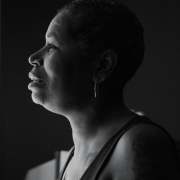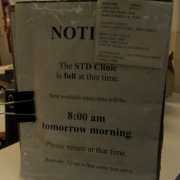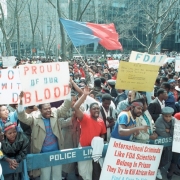Aging, Chronicity, and HIV

Washington DC-Maryland region, 2014-present
This research explores issues of aging and chronicity among those who live with HIV, particularly Black and immigrant women. Specifically I am interested in the emergent model of chronicity that undergirds the ‘end of AIDS’ discourse, and the ways it obscures the on-going HIV crisis in the southern United States and other global locales.
Projects include: (1) an investigation of the lived experience of intersectional stigma among older Black women and its impact on retention in HIV care and adherence; and (2) a visual and narrative documentation of older Black women, who have long been ignored in the history of HIV/AIDS and often cast aside as drug addicts and prostitutes, that seeks to understand their lives and struggles, and how they have contributed to the transformation of cultural ideas about sexuality, health, civil rights, and media.
Social Determinants of Sexual Health

Centers for Disease Control and Prevention, Atlanta, GA, 2009-2012
This research involved the use of rapid ethnographic assessments (REA), a qualitative method of data collection best used to assess quickly a variety of complex public health issues with the purpose of informing intervention and prevention programmatic needs, to address the social determinants of sexual health and HIV/sexually transmitted infection related disparities.
Projects included: (1) the design of a toolkit for REA that addresses community and structural level factors potentially contributing to high rates of HIV/sexually transmitted infections, (2) the implementation of three REAs addressing policy, economic, and social- level factors contributing to high HIV/sexually transmitted infection rates in vulnerable Black and Latino populations in Arizona, North Carolina, and Louisiana, and (3) the training of public health professionals in conducting REAs.
Public Health Surveillance, HIV Prevention, and Haitians

Miami, Florida and Haiti, 2004-2008
This ethnographic study explored the “success” of HIV prevention campaigns targeting racial and ethnic minorities in clinical and public health settings in South Florida and their effects on the Haitian community in particular. Through this work, I documented how medical, epidemiological, and social constructions of HIV/AIDS risk fuse notions of pathology with racial and cultural differences. I also highlighted the specific problems facing diverse immigrant and ethnic populations, and revealed that Haitians strategically identify with various institutions and diseases in order to access critical resources.
People Living with HIV in New York City

New York City, 2000-2002
This project is an ongoing prospective study of persons living with HIV/AIDS in New York City and the Tri-County region of Westchester, Rockland and Putnam Counties. As a MPH student at the Mailman School of Public Health at Columbia University, I conducted an analysis of disclosure, stigma, and service needs among adults living with HIV/AIDS in the Tri-County region. Results indicated high reports of stigma among all participants and higher rates among women than men; they also indicated that stigma did not affect disclosure patterns or access to medical services, which were inconsistent with previous reports.
